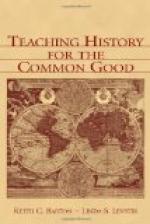6. The bulk of
the teacher’s attention should be given neither
to
the
few exceptionally able students nor to the few very
poor
pupils.
It is to the average normal boy and girl that the most
of
the questioning should be directed. The brilliant
student
should
be called on sufficiently to retain his interest and
to
set
a standard of excellence for the class. He should
be given
the
most difficult of the assignments of outside work and
if
necessary
an additional number of them. As to the few pupils
whom
the teacher deems exceptionally poor, it may be said
that
the
effect of questioning should never be to discourage
the
pupil
who has made an honest effort at preparation.
During the
early
part of the course the efforts of the teacher may well
be
directed
to asking the backward student questions to which he
can
make reasonably satisfactory answers. By saving
the student
from
the daily humiliation of failure before the class,
and by
tactfully
encouraging him to greater effort, the teacher may
shortly
discover that the poor pupil is far from hopeless.
7. Do not allow
your questions to consume a disproportionate amount
of
time with details. Until very recently in all
our history
teaching,
battles have been exalted to a place immeasurably
greater
than their importance. We are coming to see that
the
fighting
is one of the least important things in the war.
The
causes
and results, the financial, political, and social effects
now
absorb our attention. One or two battles in a
course may
profitably
be studied in detail, particularly in the history of
our
own country, but in the press of considerations far
more
interesting
and vital, it is a waste of time to give more than
a
moment’s
notice to the remainder. Student descriptions
of
battles
are bound to be stereotyped. The ordinary textbook
describes
each of the thousand battles of the world in about
the
same
fifty words.
8. Let some of
the questions be directed towards cultivating the
student’s
powers of oral description. History is not altogether
a
matter of analysis or generalization. There can
scarcely be
assigned
a lesson in history that does not contain events which
lend
themselves to dramatic description. Their recital
should be
made
the occasion of the student’s best efforts in
this
direction.
Let the pupils be taught to use adjectives and
adverbs.
Break down the barrier of listlessness or fear or
self-consciousness
which keeps the student from rendering a
graphic
and thrilling account of great events.




